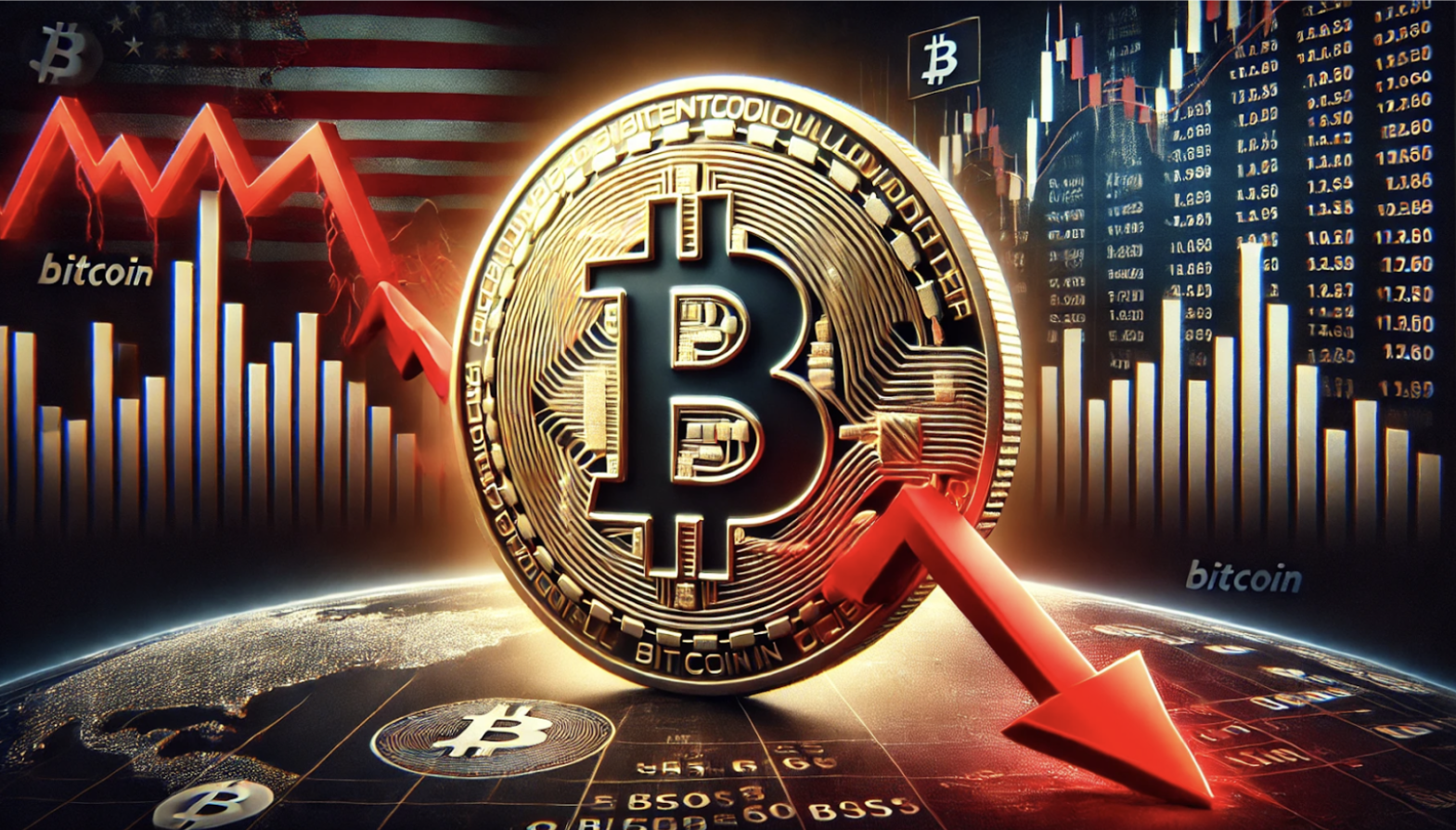Illustration of Bitcoin Plummeted, photo generated by Dall-E on GPT-4o
Bitcoin (BTC), often referred to as "digital gold," has shown a significant price drop amid rising geopolitical tension in the Middle East. On October 1st, 2024, the cryptocurrency market turned red as Bitcoin and related assets experienced a sharp decline, coinciding with escalating conflict in the region. This turn of events surprised many who had anticipated "Uptober"—a term used by the crypto community to describe the historically positive trend of October's Bitcoin price movements. Instead, the rising turmoil has pushed investors to seek safer options, significantly impacting the price of Bitcoin.
Bitcoin's Price Fall and Market Overview
As the tension in the Middle East intensified, Bitcoin’s price dropped approximately $4,000 in a short span, breaking through critical support levels and catching investors off guard. While Bitcoin's decline was notable, other commodities such as gold and crude oil surged in response to the geopolitical risks. According to Goldprice.org, gold's value rose by 1.4% to $2,665 per ounce on October 1st, nearing its record high. Meanwhile, crude oil prices increased by up to 7%, reaching $72 per barrel. This divergence of trends suggests that while Bitcoin might traditionally be seen as a "safe haven," the dynamics of global conflict are challenging that assumption.
Why Bitcoin Reacted Differently: The Middle East Conflict and Market Behavior
The immediate and sharp decline in Bitcoin’s price after the rise in Middle East tensions raises a crucial question: why did Bitcoin, often viewed as a "store of value," fall when geopolitical risks normally cause assets like gold and oil to climb? The answer lies in investor sentiment and behavior, which have shifted considerably amid the recent turmoil.
According to Li Xing, a Financial Markets Strategist Consultant at Exness, the conflict in the Middle-East prompted many investors to reposition their portfolios, favoring gold over Bitcoin as a safe store of value. Historically, gold has been a trusted asset during times of uncertainty and war, given its long-standing reputation as a stable asset, less prone to extreme volatility than cryptocurrencies. The flight to gold during these heightened geopolitical tensions reflects a preference for established safety over digital currencies like Bitcoin's more experimental and volatile nature.
This sentiment was echoed by Jeroen Blokland, founder of the Blokland Smart Multi-Asset Fund, who mentioned that many investors are reallocating their funds from Bitcoin to gold. Adam Cochran, another prominent market commentator, jokingly remarked on Bitcoin's supposed "safe haven" status in light of its price decline, pointing out the inconsistency in how the cryptocurrency is often perceived versus how it behaves during such crises.
Bitcoin vs. Gold: Which One is Better?

Illustration of Bitcoin vs Gold, photo by photo generated by Dall-E on GPT-4o
Bitcoin has long been touted as "digital gold," a safe haven that can hedge against inflation and market instability. However, its relatively young history compared to traditional assets like gold means that its "safe haven" status is not universally accepted.
While gold has consistently proven its resilience during geopolitical tension, currency crises, and inflationary environments, Bitcoin's track record is more volatile. The rapid rise and fall in Bitcoin's value and susceptibility to market speculation mean it reacts differently to geopolitical events. In this particular instance, as tensions in the Middle East escalated, investors gravitated toward the security of traditional assets like gold and oil, leading to a sell-off in Bitcoin.
The sell-off reflects a broader perception: during heightened uncertainty, investors may prefer to put their funds into assets with a historical record for preserving wealth. Gold’s price surge during the Middle East conflict underscores this point, while Bitcoin’s decline highlights the market’s skepticism about its reliability as a safe haven during geopolitical crises.
Investor Psychology and Market Sentiment
Investor behavior is a driving force in the performance of assets like Bitcoin and gold during times of geopolitical unrest. Key points on how investor sentiment plays a role include:
- Tendency Toward Safety & Stability: When geopolitical conflicts arise, fear and uncertainty tend to push investors toward assets that are considered safe and stable. Gold fits this profile due to its historical performance, while Bitcoin is seen as a more speculative and volatile choice.
- Perception of Bitcoin as Risky: Even though Bitcoin is liquid and easily traded, its price volatility discourages investors from considering it a stable store of value. This became evident during the recent Middle East tensions, where investors preferred gold's perceived safety over the potential upside—and corresponding risk—of Bitcoin.
Broader Implications for the Crypto Market
Bitcoin’s price drop during the Middle East tension is not just an isolated event; it reflects broader trends in the cryptocurrency market. The correlation between global events and crypto prices has become more apparent as digital assets have gained mainstream acceptance and attention. While this exposure can lead to rapid gains during positive market sentiment, it also subjects cryptocurrencies to sharp declines during periods of uncertainty and geopolitical tension.
Furthermore, the performance of related stocks and other cryptocurrencies also followed Bitcoin’s downward trend. Ethereum (ETH), the second-largest cryptocurrency by market cap, and altcoins across the board saw declines, echoing the impact of Bitcoin's drop and further demonstrating how Bitcoin often sets the tone for the entire crypto market.
What Does This Means for Investors?
The sharp decline in Bitcoin’s price due to the Middle East conflict reminds global investors of the asset's volatile nature and current perception. While it’s essential to note that Bitcoin has proven resilient in the past and has bounced back from similar corrections, this event highlights the need for investors to carefully consider diversification and risk management when allocating funds to digital assets.
Investors who expected October to be a positive month for Bitcoin—hence the term "Uptober"—were met with a stark contrast as geopolitical tensions caused an unexpected shift in market sentiment. The crypto market’s reaction to such events underscores the importance of understanding how global events can impact digital assets and how different assets respond to crises.
Bitcoin's Path Forward
While Bitcoin has faced many challenges throughout its history, ranging from regulatory scrutiny to macroeconomic turbulence, it has generally shown resilience and adaptability. The recent price drop, fueled by geopolitical tensions, raises questions about Bitcoin’s long-term status as a safe haven asset. It is a reminder that, while Bitcoin is often marketed as "digital gold," it does not yet behave like gold in the face of global unrest.
Bitcoin's path forward will depend on how it is perceived as an asset in various market conditions. As institutional adoption increases and the asset matures, its role during geopolitical conflicts may shift, potentially bringing it closer to the stability and security associated with traditional safe havens like gold.
For now, however, investors should approach Bitcoin with an understanding of its current market dynamics—volatile, speculative, and highly reactive to global events. Balancing the potential upside of holding Bitcoin with the inherent risks is crucial, especially during times of geopolitical tension.




